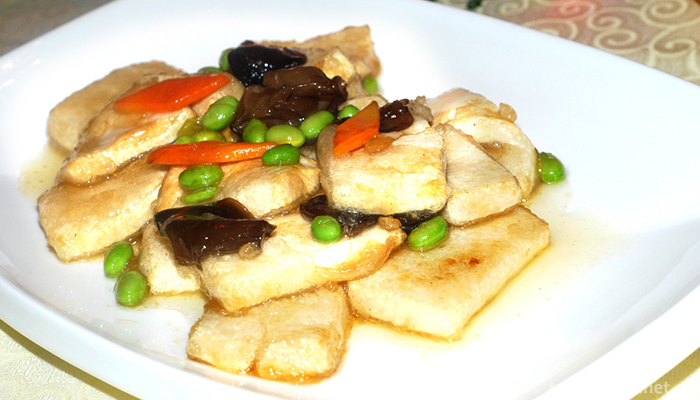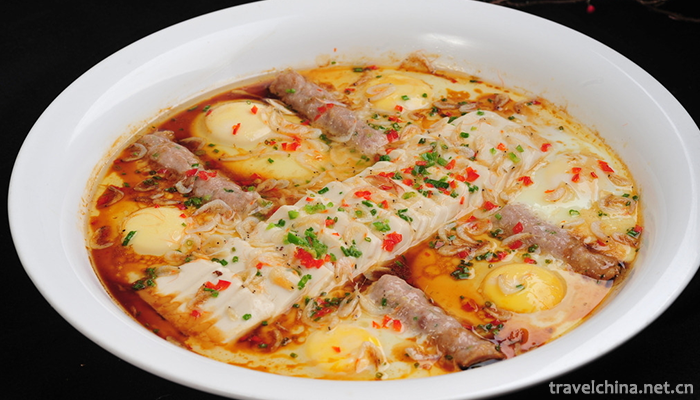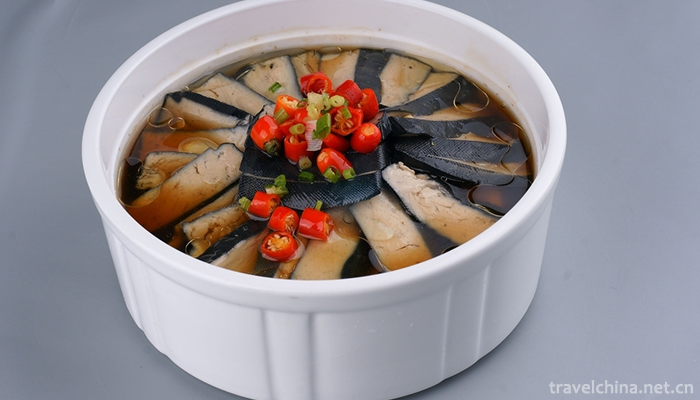Bagongshan bean curd
Bagongshan Tofu, also known as Four Seasons Tofu, is a local traditional snack in Huainan City, Anhui Province. Bagongshan tofu is crystal clear, white like jade board, tender like congealed fat, delicate texture, refreshing and smooth, without yellowish pulp water taste, support is not fragmented. Chengdu cuisine is golden in color, crisp outside and tender inside, delicious in taste.
On September 17, 2008, the General Administration of Quality Supervision and Inspection (AQSIQ) approved it as a geographical indication product. In September 2018, it was rated as the top ten classic Anhui dishes of "Chinese cuisine".
Product characteristics
Nutritive value
Tofu is rich in nutrition and has the reputation of "vegetable meat". It contains not only many trace elements such as iron, calcium, phosphorus, magnesium and so on, but also sugar, vegetable oil and abundant high-quality protein. The digestive absorption rate of tofu is over 95%. Two pieces of tofu can meet a person's daily calcium requirement .
Characteristics of dishes
Bagongshan tofu is crystal clear, white like jade board, tender like congealed fat, delicate texture, refreshing and smooth, without yellowish pulp water taste, support is not fragmented. Chengdu cuisine is golden in color, crisp outside and tender inside, delicious in taste.
Main functions
Tofu is sweet and cool in nature. It enters the spleen, stomach and large intestine meridians. It has the functions of invigorating the spleen and replenishing qi, invigorating the spleen and dampness, clearing away heat and detoxification. It is very effective for deficiency of body, shortage of breath and food, insufficient milk secretion, kidney deficiency, urination or short and frequent urination, cloudy, pyretic fever, acne acne, dry throat, lung fever, cough, epigastric distention, dysentery and so on.
historical origin
In the Western Han Dynasty, it was said that Liu An, king of Huainan, used Bagongshan spring water, soybeans and brine to make elixirs for longevity. As a result, Xiandan was not available, but he inadvertently invented tofu, which was called "Bagongshan tofu".
Habitat environment
Bagongshan tofu originated in Huainan area of Anhui Province. It has a history of more than 2,000 years. The best quality of the tofu is in Bagongshan area of Huainan, which is called "Bagongshan tofu". This kind of tofu is made of pure soybean and refined with Bagongshan spring water. The local peasants'skill of making tofu has been handed down from generation to generation. Many people have mastered a good set of skills. The tofu made is fine, white, fresh and tender, and is very popular with the masses. According to the Compendium of Materia Medica written by Li Shizhen, a famous medical scientist in the Ming Dynasty, "The law of tofu began with Liu'an, the king of Huainan." Wang Ji of the Qing Dynasty said that the ancient books of the Western Han Dynasty had the record that Liu An made tofu. Liu An, the grandson of Liu Bang in Han Dynasty, was founded in Shouchun (now Shouxian County), where he recruited thousands of guests and scholars. Among them, Sufei, Li Shang, Tian You Leibei, Wubei, Jinchang, Mao Quilt and eight Zuo Wu people are known as "Eight Gong".
Production situation
There are more than 3000 soybean products processors in Bagongshan tofu Huainan City, and the output value reached more than 1 billion yuan in 2013. In 2015, the annual sales revenue of soybean products industry in Huainan will reach 3 billion yuan.
Honors
Time, honorary title/award, department/occasion
August 2008 National Geographic Indicators Products . AQSIQ
July 2014 Selected into the Fourth National List of Intangible Cultural Heritage . Ministry of Culture of the State Council
geographical indication
Protection Scope of Geographical Indicators of Bagongshan Tofu to the People's Government of Huainan City, Anhui Province
Letter on Defining the Protection Scope of Bagongshan Tofu Geographical Indications Products (No. 85 of Huaifu Secretariat ) and Letter of Shouxian People's Government on Defining the Protection Scope of Bagongshan Tofu Products Geographical Indications Products (No. Shou Zheng Secretary ).
Quality Technical Requirements
Bagongshan tofu, Huainan local standard; In 2007, Anhui Provincial Quality Supervision Bureau issued Bagongshan tofu, water tofu and skin, dried tofu, curd, 1000 pieces of provincial local standards. In 2008, "Bagongshan Tofu Anhui Provincial Standard" was issued.
Scope of geographical protection
Bagongshan tofu was awarded the title of geographical indication product in 2008. Its protection scope is as follows: Bagongshan District, Huainan City, Ancheng Town, Tianjiaan District, Liyongzi Town, Wangfenggang Street and Tangshan Town, Gaohuang Town, Pingwei Town, Tianji Street, Panji Town, Luji Town, Qiji Town, Gugou Hui Town and Jiahe Town, eight townships and eight townships in Shouxian County, Luan City. Shanxiang, Shouchun and Jiangou Towns are now under the jurisdiction of the three townships.
Use of special logo
Bagongshan tofu won the title of geographical indication product in 2008.



0 Questions
Ask a Question
Your email address will not be published.